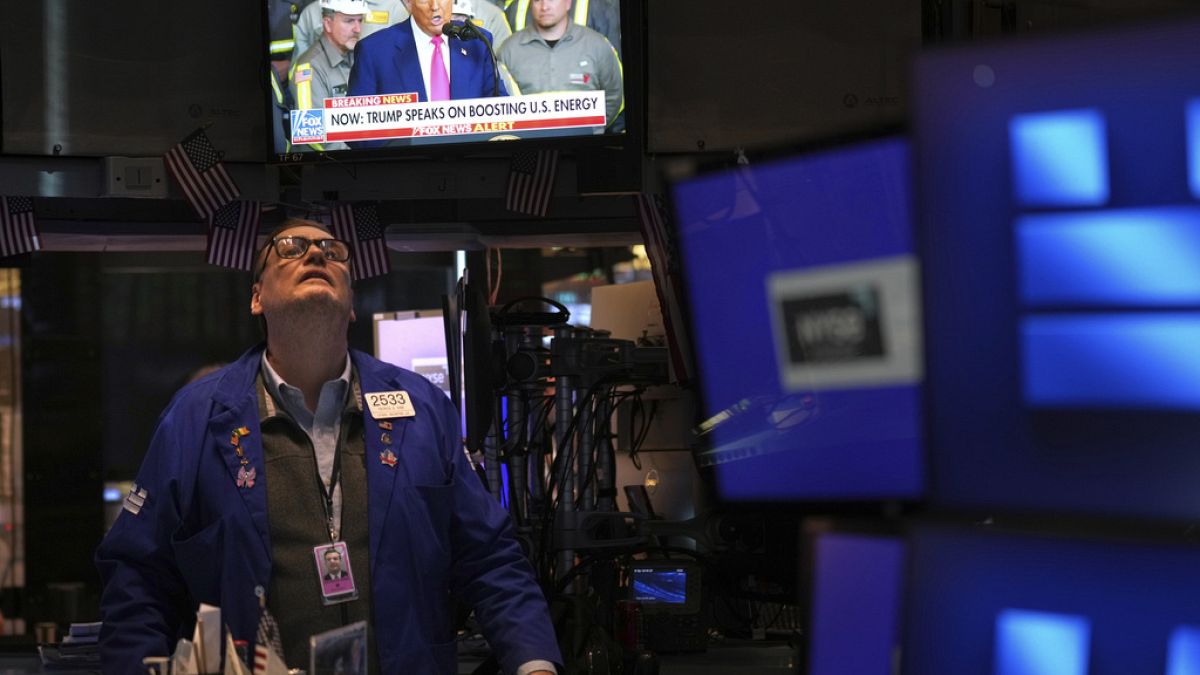Stock markets worldwide keep swinging as President Donald Trump’s trade war keeps escalating.
In the US, the S&P 500 was bobbing between small gains and losses in early trading on Wednesday.
The index is about 19% below its record set less than two months ago. The Dow Jones Industrial Average opened lower, by 0.5%, while the tech-heavy Nasdaq composite started trading 0.5% higher.
Shortly after the opening bell, however, all the three main indexes turned green, by 4pm CEST in Europe, the Nasdaq was up by 1.2%, while the Dow Jones and S&P 500 rose 0.3%.
Some of the best performing stocks included Apple, Microsoft, Walmart, Tesla and Delta Airlines, which has just given its first profit warning after the tariffs were announced.
Volatility continues
The market volatility comes as Trump’s latest round of tariffs kicked in after midnight, imposing taxes on imports from around the world, and China retaliated with more tariffs of its own. Treasury yields rose sharply.
Before the stock markets opened in the US, futures were already sinking in pre-market trading after massive US tariffs against China also came into force overnight. China then retaliated with a huge tariff increase on US imports.
The US dollar lost its value against safe-haven currencies and the euro, as a major sell-off in Treasuries sent the message that foreign funds are leaving US assets.
The US Dollar plummeted against the euro by 0.82%, and 0.7% against the Japanese yen. The also safe-heaven asset Swiss franc gained 1% against the dollar.
Gold futures are up by more than 3.5% to a price flirting with $3,100 per ounce.
Oil prices also decline
Oil prices tumbled to their lowest level in more than four years.
By 4 pm in Europe, prices for US crude oil skidded more than 3.7% to $57.36 per barrel, their lowest level since February 2021, when the US and global economies were still emerging from the COVID-19 pandemic. Rapidly falling oil prices often signal investor pessimism about economic growth and can signal a recession ahead.
Brent crude, the European standard, traded down by 3.6% just above $60.60 per barrel.
Meanwhile, a huge sell-off in US Treasuries sent bond yields soaring, the latest signal of the gloom and doom investors expect the global economy is facing. The yield on the 10-year Treasury — normally considered a safe haven during volatile equity markets — jumped 17 basis points to 4.44% early Wednesday.
The first profit warnings
Meanwhile, Delta Air Lines pulled its guidance for 2025 on Wednesday as the trade war scrambles expectations for business and household spending and depresses bookings across the travel sector.
“With broad economic uncertainty around global trade, growth has largely stalled,” CEO Ed Bastian said in a statement on Wednesday. “In this slower-growth environment, we are protecting margins and cash flow by focusing on what we can control.”
Even though the airline’s profit for the most recent quarter came in better than Wall Street expected, Delta shares were mostly unchanged in pre-market trading.
The airline sector has been battered this year as investors, anticipating rising tariffs, put their money elsewhere. Shares are down 41% this year for the nation’s most profitable airline, which is better than rivals American and United.
Pharmaceutical sector next in line?
Shares of pharmaceutical companies were also hit hard in off-hours trading after Trump said on Tuesday night that he plans tariffs on pharmaceuticals so that more medications would be made in the US.
Pfizer and Merck each lost more than 4%. Most other big drugmakers were down between 2% and 4%, including Johnson & Johnson, Bristol Myers Squib and Eli Lilly.
The escalating global trade war — particularly between the US and China — has sent markets careening this year with uncertainty about how the global economy will hold up to America’s new isolationist trade policy.
From uncertainty to recession
Analysts predict that markets will have more swings up and down given uncertainty over how long Trump will keep the stiff tariffs on imports, which will raise prices for US shoppers and slow the economy. If they persist, economists and investors expect them to cause a recession. If Trump lowers them through negotiations relatively quickly, the worst-case scenario might be avoided.
Hope still remains on Wall Street that negotiations may be possible, which helped drive the morning’s rally. Trump said on Tuesday that a conversation with South Korea’s acting president helped them reach the “confines and probability of a great DEAL for both countries.”
Trump’s trade war is an attack on globalisation that’s shaped the world’s economy and helped bring down prices for products on store shelves but also caused manufacturing jobs to leave for other countries.
Trump has said he wants to narrow trade deficits, which measure how much more the United States imports from other countries than it sends to them as exports.

